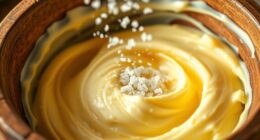While butter adds flavor and nutrients to your meals, too much can lead to health issues. Its high saturated fat content can increase cholesterol levels, raising your risk of heart disease and obesity. Regular consumption of more than 1-2 tablespoons daily might contribute to hypertension and even type 2 diabetes. Although butter contains beneficial vitamins and can help with nutrient absorption, it's essential to enjoy it in moderation. Balancing butter with healthier alternatives may support your overall wellness. You might find that understanding these aspects leads to smarter choices in your diet.
Key Takeaways
- High saturated fat content in butter can elevate cholesterol levels, increasing the risk of heart disease and hypertension.
- Excessive butter consumption may contribute to obesity and raise the chances of developing type 2 diabetes.
- Overindulgence in butter can lead to elevated blood pressure, particularly when combined with refined products.
- Butter's calorie density can hinder weight management if not consumed in moderation within a balanced diet.
- Individuals with existing health conditions should monitor butter intake to avoid exacerbating their health issues.
Understanding Butter

Butter, a staple in many kitchens, is created by churning cream or milk to separate the butterfat from buttermilk. This dairy product typically contains about 80% fat, making it a rich source of calories—around 102 calories per tablespoon. If you're watching your caloric intake, it's important to be mindful of how much butter you're using in your cooking and baking. Additionally, butter's high fat content can enhance the richness of baked goods and savory dishes alike. Regular consumption of herbal alternatives can also help maintain skin health and vitality.
One key aspect of butter is its fat composition. About 63% of the fat in butter is saturated fat, which has sparked debates about its health implications. While saturated fat is often viewed with caution, butter also provides essential nutrients like vitamins A, D, and K, which can be beneficial in moderation. Additionally, there are various types of butter that can enhance your culinary creations while offering different nutritional profiles. Butter's health considerations are also crucial to understand when incorporating it into your diet.
You'll find various types of butter available, including salted, unsalted, grass-fed, whipped, and clarified (ghee), each serving different culinary purposes. The choice of butter can significantly impact the final taste and texture of your dishes, making it essential to select the right kind for your recipes.
Butter enhances flavors in dishes, making it a popular choice, but its high caloric density means you should use it sparingly. Understanding butter's composition and how it fits into your diet can help you make informed choices about its consumption.
Nutritional Profile of Butter

When considering how butter fits into your diet, it's helpful to look at its nutritional profile. One tablespoon (14 grams) of butter contains about 102 calories and 11.5 grams of total fat, with approximately 7.2 grams being saturated fat.
While it's true that around 63% of the fat content in butter is saturated fat, recent studies suggest a more nuanced understanding of its impact on heart health. Additionally, consuming butter with foods rich in fat-soluble vitamins can enhance nutrient absorption. Butter's creamy texture and flavor are influenced by the emulsification process that occurs during churning, contributing to its enjoyment in various culinary applications. Furthermore, using butter in moderation is consistent with eco-friendly practices that promote healthier cooking methods.
Butter isn't just fat; it also provides essential fat-soluble vitamins. Each tablespoon gives you 11% of the Reference Daily Intake (RDI) for Vitamin A, along with small amounts of Vitamins E, B12, and K, riboflavin, niacin, calcium, and phosphorus. Moderate butter consumption can also contribute to the intake of these nutrients, enhancing the absorption of fat-soluble vitamins when consumed with other nutrient-rich foods.
Additionally, butter contains healthy fats and beneficial compounds like butyrate, known for its anti-inflammatory properties and support for digestive health. In a balanced diet, moderate consumption of butter—about 1 to 2 tablespoons daily—can be a flavorful way to incorporate these nutrients while enjoying your meals. Furthermore, incorporating sustainable grooming practices into your lifestyle can help promote overall wellness and health.
Health Benefits of Butter

Incorporating butter into your diet can offer several health benefits that go beyond its rich flavor. For starters, butter is rich in nutrients like Vitamin A and Vitamin D, which support brain function, nervous system health, and skeletal development. Additionally, the presence of butyrate, a short-chain fatty acid in butter, promotes digestive health and has anti-inflammatory properties, making it a great choice for maintaining gut wellness. Butter can also provide antioxidants that help combat oxidative stress in the body. Furthermore, butter contains fat-soluble vitamins that are essential for various bodily functions. Butter's historical significance as a staple food in many cultures also highlights its longstanding importance in human diets. Moreover, the high fiber content of foods paired with butter can enhance its digestive benefits.
Regular moderate consumption of butter can also provide beneficial compounds like Conjugated Linoleic Acid (CLA), which may assist in weight management and even exhibit anticancer properties. Plus, butter enhances the absorption of fat-soluble vitamins from other foods, making it an excellent addition to a balanced diet, especially when paired with vegetables.
Moreover, the antioxidants found in butter, such as carotenoids, support cell regrowth and help bolster your immune system. Butter's nutritional profile showcases its rich content of vitamins and fatty acids that contribute to overall health. When enjoyed in moderation, butter contributes to heart health, allowing you to savor its rich flavor while reaping various health benefits. So, don't shy away from this tasty staple; it can play a role in your overall well-being!
Negative Effects of Butter

What happens when you indulge in butter without considering moderation? You may unknowingly elevate your heart disease risk and contribute to other serious health issues.
Butter is high in saturated fat, which can lead to obesity, hypertension, and even increase your chances of developing type 2 diabetes if consumed excessively.
If you already have heart disease or high blood pressure, it's vital to limit your butter intake. The saturated fat in butter can raise your cholesterol levels, worsening these conditions.
Additionally, if you combine butter with white flour products, you may further increase your risk of obesity and related health problems.
It's essential to approach butter consumption with moderation. While it does offer a rich flavor and some nutritional benefits, the potential negative impacts on your health can outweigh these perks if you overindulge.
Striking a balance is key; enjoy butter occasionally, but be mindful of your overall dietary choices. By doing so, you can savor its taste without jeopardizing your health.
Role in Weight Management

- Grass-fed butter contains conjugated linoleic acid (CLA), which may help reduce body fat. Additionally, anti-inflammatory properties found in foods like turmeric can complement a balanced diet that includes butter. Establishing clear savings goals can also help with financial planning for healthier lifestyle choices. Consuming whole, unprocessed foods alongside butter can enhance overall nutritional benefits. Using a butter infuser can further elevate the flavors and health benefits of infused butter when combined with various herbs.
- Aim for 1-2 tablespoons of butter daily, keeping saturated fat under 10% of your daily calories.
- With 63% of butter's fat being saturated, balance is essential to avoid excessive calorie intake.
- Adding butter to whole foods can improve nutrient absorption and increase satiety.
- Monitor your total calorie intake to stay within your daily goals.
- Additionally, incorporating healthy fats like MCT oil can further enhance energy levels while following a keto diet.
Butter Substitutes and Alternatives

If you're looking to cut back on butter, there are plenty of tasty alternatives that can help. Healthier spread options like buttery spreads and coconut spreads reduce saturated fat while adding flavor. Additionally, chia seeds, known for their high nutritional value, can be used as a nutritious ingredient in various recipes, enhancing both flavor and health benefits. Chia seeds are a complete protein source, making them an excellent addition to your diet. They are also rich in omega-3 fatty acids, which are beneficial for heart health. Nut butters also bring unique tastes and healthy fats to your dishes, making them great substitutes in both spreads and cooking. Consider incorporating dairy-free butter options into your diet for a versatile and flavorful alternative.
Healthier Spread Options
Exploring healthier spread options can transform your meals and snacks while reducing saturated fat intake. You don't have to stick with traditional butter; there are plenty of delicious alternatives that provide unsaturated fats and enhance your dishes.
Here are some spreadable options to contemplate:
- Spreadable butters: These combine butter with vegetable oils, lowering saturated fat while keeping flavor intact.
- Buttery spreads: Made with olive or canola oil, they offer fewer calories and provide beneficial unsaturated fats that can improve cholesterol levels.
- Avocado: Mashed avocado is rich in healthy monounsaturated fats and brings a creamy texture to your sandwiches or toast.
- Aquafaba mayonnaise: This dairy-free option, made from whipped chickpea liquid, is lower in calories and provides a creamy texture without the saturated fats.
- Nut butters: Almond or peanut butter packs in healthy fats, protein, and fiber, making them a satisfying and nutrient-rich substitute.
Nut Butters Benefits
Nut butters serve as a fantastic alternative to traditional butter, offering a range of health benefits that can enhance your diet. Nut butters, like almond, cashew, and peanut butter, are rich in healthy monounsaturated fats, which can help lower bad cholesterol levels and reduce the risk of heart disease. By choosing nut butters, you're not just swapping spreads; you're making a healthier choice for your heart.
These nutty options provide about 7-8 grams of protein per two-tablespoon serving, making them a nutritious substitute. They're also high in fiber, which aids digestion and promotes a feeling of fullness, potentially assisting with weight management.
Plus, many nut butters contain essential vitamins and minerals, including vitamin E, magnesium, and potassium, contributing to your overall health and well-being. Unlike traditional butter, which is high in saturated fat, nut butters generally have a lower saturated fat content. This makes them a heart-healthier choice when consumed in moderation.
Cooking With Substitutes
When you're looking to make healthier choices in your cooking, butter substitutes can play a key role in transforming your meals without sacrificing flavor. By incorporating these alternatives, you can enjoy heart-healthy fats while reducing saturated fat intake.
Here are some popular butter substitutes to evaluate:
- Margarine: Made from vegetable oils, it typically contains less saturated fat, making it a heart-healthier option.
- Spreadable Butters: These combine butter with vegetable oils for a lower saturated fat content while maintaining that classic buttery taste.
- Nut Butters: Almond or peanut butter can replace butter in baking, offering healthy fats and added protein.
- Coconut Oil: A dairy-free option for cooking and baking, though it's high in saturated fat, so use it sparingly.
- Aquafaba Mayonnaise: Whipped chickpea liquid substitutes for butter, providing moisture and texture in recipes.
Experimenting with these butter substitutes can help you create delicious meals while prioritizing your health.
Types of Butter

Although butter comes in various forms, each type offers unique flavors and cooking properties that can enhance your culinary experience.
One popular option is grass-fed butter, which is lower in saturated fat and richer in vitamins K and A due to the cows' grass-based diet. This can provide added health benefits over conventional butter.
Whipped butter is another type that's aerated, increasing its volume and making it lighter. While it's great for spreading, keep in mind that it contains less fat per tablespoon, making it less ideal for cooking.
If you're looking to cut calories, reduced-fat butter has about 40% less milk fat, but this higher water content can alter the texture of your baked goods.
Clarified butter, or ghee, is made by removing milk solids, which gives it a higher smoke point, perfect for high-heat cooking. Plus, it's suitable for those with lactose intolerance.
While margarine is a popular alternative, it's important to remember that it's made from vegetable oils and has unsaturated fats, differing considerably from the rich flavor of butter.
Understanding these types of butter can help you choose the right one for your needs.
Cooking With Butter

Cooking with butter adds a rich flavor and creamy texture that elevates a variety of dishes. Whether you're sautéing vegetables, pan-frying meats, or baking pastries, butter can enhance your cooking experience.
With its high smoke point, clarified butter (or ghee) is perfect for high-heat methods, ensuring you get that delicious taste without burning.
To make the most of cooking with butter, consider these tips:
- Use it to sauté vegetables for better absorption of fat-soluble vitamins (A, D, E, and K).
- Combine butter with healthy fats like olive oil to create a balanced flavor profile.
- Keep portion sizes in check since one tablespoon contains about 102 calories and 11.5 grams of total fat, mostly saturated fat.
- Use it in baking for a flaky texture in pastries and biscuits.
- Experiment with different types of butter for unique flavors in your dishes.
Moderation and Dietary Balance

Moderation is key to enjoying butter while maintaining a balanced diet. Ideally, you should limit your butter intake to 1-2 tablespoons daily. This approach helps balance its high calorie and saturated fat content within your overall dietary needs.
The U.S. Dietary Guidelines recommend keeping saturated fat to less than 10% of your daily calories, which is about 22 grams for a 2,000-calorie diet, roughly equating to 3 tablespoons of butter.
To achieve dietary balance, think about incorporating butter alongside nutrient-dense foods like vegetables and whole grains. This not only enhances the absorption of fat-soluble vitamins but also contributes to a healthier overall diet.
Research indicates that moderate butter consumption typically doesn't increase the risk of obesity or heart disease when it's part of an overall healthy eating pattern.
You can further support heart health by combining butter with healthier fats, such as those found in olive oil, nuts, and fatty fish.
Further Reading and Resources

If you're curious about the health risks associated with butter, there are plenty of studies that lay out the facts.
You'll find nutritional considerations that explain both the benefits and potential drawbacks of butter consumption.
Exploring these resources can help you make informed choices about how butter fits into your diet.
Health Risks Overview
Butter, while a popular ingredient in many kitchens, poses significant health risks when consumed in excess. High butter consumption is mainly due to its saturated fat content, which can lead to obesity and other health concerns. The American Heart Association recommends limiting saturated fat to less than 10% of your daily calories, which is about 22 grams for a 2,000-calorie diet.
Here are some key health risks to take into account:
- Increased risk of heart disease due to elevated cholesterol levels
- Higher chances of developing hypertension and type 2 diabetes
- Potential weight gain from high calorie and fat content
- Exacerbation of existing conditions like high cholesterol or heart disease
- Unbalanced diet when combined with refined carbohydrates
If you have existing health conditions, you should limit your butter intake. Moderation is essential; enjoying 1-2 tablespoons daily can help you reap the flavor without overwhelming your health.
Always be mindful of your overall dietary balance and how butter fits into it. Prioritizing your well-being means being aware of the health risks associated with excessive saturated fat consumption.
Nutritional Considerations
When evaluating your overall nutrition, it's important to assess how butter fits into your diet. Butter is high in calories—just one tablespoon packs 102 calories and 11.5 grams of fat, primarily saturated fat. Dietary guidelines recommend consuming saturated fat in moderation, ideally limiting it to less than 10% of your daily calories. For a 2,000-calorie diet, that's about 22 grams.
Despite its reputation, butter does offer essential nutrients. One tablespoon provides about 11% of the Reference Daily Intake for Vitamin A, which supports vision and immune health. Additionally, butter contains beneficial compounds like butyrate, which can aid digestive health and reduce inflammation.
However, if you have high cholesterol or heart disease, it's wise to reflect on healthier fat alternatives. While butter can fit into a balanced diet, moderation is key to managing your overall saturated fat intake.
Always pay attention to how much you're using, and try balancing it with healthier fats like olive oil or avocados. By making informed choices, you can enjoy butter while keeping your nutrition on track.
Frequently Asked Questions
What Are the Side Effects of Eating Butter?
Eating butter can have several side effects if you consume it in excess.
You might notice weight gain due to its high calorie and fat content. High saturated fat levels can raise your LDL cholesterol, increasing your risk of heart disease.
If you have existing health issues like high blood pressure or cholesterol, you could experience worsened outcomes.
Additionally, overindulgence might lead to insulin production problems, raising your risk of type 2 diabetes.
What Are the Health Risks of Butter?
Imagine your arteries as a busy highway. When you eat butter, you're adding more traffic—saturated fats can elevate your LDL cholesterol, causing congestion.
If you're consuming too much, you risk obesity, high blood pressure, and even type 2 diabetes. The American Heart Association suggests limiting saturated fats to less than 10% of your daily calories.
What Does Butter Do to the Human Body?
Butter can provide essential vitamins A and D, which support your immune system and bone health.
It contains butyrate, a compound that may benefit your digestive health and reduce inflammation.
However, because butter is high in saturated fat, it can elevate your LDL cholesterol levels if consumed in excess.
Monitoring your portion sizes is vital, especially if you have existing health conditions that could be exacerbated by high-fat diets.
Who Should Avoid Butter?
Imagine indulging in a rich, creamy dish, only to discover it's not the best choice for you.
If you've got high cholesterol, heart disease, or hypertension, you should steer clear of butter.
Those with dairy allergies or lactose intolerance need to avoid it too, since it can trigger nasty reactions.
And if you're on a weight loss journey or following a vegan diet, keeping butter off your plate is a smart move.
Conclusion
In the end, enjoying butter can be a delightful experience, but it's all about balance. You might find yourself savoring its rich flavor in your favorite dishes, but remember, moderation is key. Coincidentally, the more you learn about butter's benefits and drawbacks, the better choices you can make for your health. So go ahead, indulge a little, but be mindful of how it fits into your overall diet. Happy cooking!









